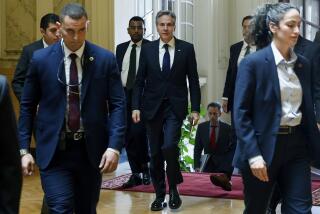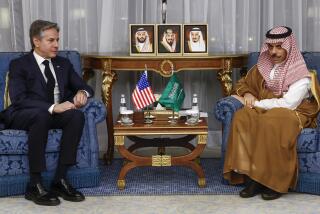Clinton Urges On Mideast Peace Process
- Share via
OSLO — Amid growing concern that the Middle East peace process is stagnating again, President Clinton met separately with the Israeli and Palestinian leaders here Monday to nudge them toward an agreement on a final treaty.
Israeli Prime Minister Ehud Barak and Palestinian Authority President Yasser Arafat held their own face-to-face meeting late Monday. The three men are to meet together today.
Despite these sessions, no substantive breakthroughs are expected out of the two-day summit. The meetings are intended to prod Arafat and Barak to agree on a framework and a process for moving toward a final peace agreement, according to a senior Clinton administration official.
Clinton openly sought to temper expectations as he arrived in this blustery capital.
“I don’t think you should expect some sort of major announced breakthrough here,” he said. “But . . . we can come out of this meeting and this solemn occasion with a renewed commitment to the peace process.”
The “solemn occasion” is a memorial service today for Yitzhak Rabin, the Israeli prime minister assassinated on Nov. 4, 1995, by an ultranationalist Jew trying to prevent the hand-over of West Bank land to the Palestinians.
Clinton landed in Oslo on Monday morning after flying all night from Washington, and several hours later his motorcade arrived at the hilltop palace of Norway’s King Harald V. Thousands of Norwegians lined the city’s streets to watch.
Clinton, who visited Norway 30 years ago while a Rhodes scholar at Oxford, is the first sitting U.S. president to visit this nation.
Clinton also is scheduled to meet here today with Russian Prime Minister Vladimir V. Putin. The president intends to express his concern over the violence in the separatist republic of Chechnya and to encourage Moscow to engage in a political dialogue with Chechen leaders, White House Press Secretary Joe Lockhart said.
Concern over the Middle East peace process has escalated because there have been few concrete developments since a flurry of meetings after Barak was elected in May.
Israel has released about 350 Palestinian prisoners and opened a safe-passage route so that Palestinians for the first time can cross Israel to travel between the Palestinian-controlled areas of the West Bank and Gaza Strip.
The cornerstone of the agreement the two sides reached in the Egyptian resort of Sharm el Sheik in September was the launching of so-called final-status talks--negotiations to resolve such fundamental disputes as final borders, the fate of Jerusalem, the status of 3 million Palestinian refugees and water rights.
A one-year deadline was set for the conclusion of those negotiations. A ceremonial inauguration of the final-status talks was held Sept. 13, and then nothing happened until last Friday, when negotiators participated in their first actual meeting. The two sides agreed then to start negotiations in earnest in early November.
“This is the hard part, the really hard part, and we all need to support them,” Clinton told reporters during a question-and-answer session with Norwegian Prime Minister Kjell Magne Bondevik.
“What we’ve got to do is create a renewed energy to make the process continuous,” the president said.
Just before meeting with Clinton, Arafat told reporters that two of the most sensitive topics standing in the way of a permanent peace are Israeli settlements in the West Bank and future control of Jerusalem.
“We consider holy Jerusalem as the capital of the independent Palestinian state,” Arafat said.
He emerged from the meeting with a smile, saying, “As usual, it was constructive and positive, successful and warm.”
In his talks with Clinton, Barak emphasized “red lines” on issues where compromise is impossible, according to a senior Israeli official.
Earlier, Barak said he believed that one outcome of the Oslo talks might be the setting of a target date for a Camp David-style summit--such as the marathon that produced an Israeli-Egyptian peace treaty in 1978--possibly in Washington early next year.
Senior officials in Barak’s government have been quoted as saying the prime minister would be willing to use such a meeting to formally recognize a Palestinian state.
“We reiterate our determination to move determinedly, simultaneously, on all tracks--Palestinian, Syrian, Lebanese and multilateral--supported and backed by the goodwill of the international community and the United States,” Barak said.
Clinton said that it is premature to discuss such a meeting but that he is open to the idea.
“There is nothing that I would not do if I thought it would genuinely help to build a lasting peace in the Middle East,” he said.
The gathering in Rabin’s memory might “give some new energy to this process,” Clinton said, as he praised Barak and Arafat for cooperating on a timetable and security concerns.
*
Chen reported from Oslo and Wilkinson from Jerusalem.
More to Read
Get the L.A. Times Politics newsletter
Deeply reported insights into legislation, politics and policy from Sacramento, Washington and beyond. In your inbox twice per week.
You may occasionally receive promotional content from the Los Angeles Times.










